- Home
- Neil Gaiman
American Gods Page 29
American Gods Read online
Page 29
“All at the same time?”
“Don’t get smart with me, m’boy. You can keep out of sight in Lakeside. I pulled in a big favor to keep you here, safe and sound. If you were in a city they’d get your scent in minutes.”
“I’ll stay put and keep out of trouble.” Shadow meant it as he said it. He’d had a lifetime of trouble and he was ready to let it go forever. “When are you coming back?” he asked.
“Soon,” said Wednesday, and he gunned the Lincoln’s engine, slid up the window, and drove off into the frigid night.
CHAPTER ELEVEN
Three may keep a secret, if two of them are dead.
—Ben Franklin, Poor Richard’s Almanack
Three cold days passed. The thermometer never made it up to the zero mark, not even at midday. Shadow wondered how people had survived this weather in the days before electricity, before thermal face masks and lightweight thermal underwear, before easy travel.
He was down at the video, tanning, bait and tackle store, being shown Hinzelmann’s hand-tied trout flies. They were more interesting than he had expected: colorful fakes of life, made of feather and thread, each with a hook hidden inside it.
He asked Hinzelmann.
“For real?” asked Hinzelmann.
“For real,” said Shadow.
“Well,” said the older man. “Sometimes they didn’t survive it, and they died. Leaky chimneys and badly ventilated stoves and ranges killed as many people as the cold. But those days were hard—they’d spend the summer and the fall laying up the food and the firewood for the winter. The worst thing of all was the madness. I heard on the radio, they were saying how it has to do with the sunlight, how there isn’t enough of it in the winter. My daddy, he said folk just went stir crazy—winter madness they called it. Lakeside always had it easy, but some of the other towns around here, they had it hard. There was a saying still had currency when I was a kid, that if the serving girl hadn’t tried to kill you by February she hadn’t any backbone.
“Storybooks were like gold dust—anything you could read was treasured, back before the town had a lending library. When my grampaw got sent a storybook from his brother in Bavaria, all the Germans in town met up in the town hall to hear him read it, and the Finns and the Irish and the rest of them, they’d make the Germans tell them the stories.
“Twenty miles south of here, in Jibway, they found a woman walking mother-naked in the winter with a dead babe at her breast, and she’d not suffer them to take it from her.” He shook his head meditatively, closed the fly cabinet with a click. “Bad business. You want a video rental card? Eventually they’ll open a Blockbusters here, and then we’ll soon be out of business. But for now we got a pretty fair selection.”
Shadow reminded Hinzelmann that he had no television, and no VCR. He enjoyed Hinzelmann’s company—the reminiscences, the tall tales, the goblin grin of the old man. It could make things awkward between them were Shadow to admit that television had made him uncomfortable ever since it had started to talk to him.
Hinzelmann fished in a drawer, and took out a tin box—by the look of it, it had once been a Christmas box, of the kind that contained chocolates or cookies: a mottled Santa Claus, holding a tray of Coca-Cola bottles, beamed up from its lid. Hinzelmann eased off the metal top of the box, revealing a notebook and books of blank tickets, and said, “How many you want me to put you down for?”
“How many of what?”
“Klunker tickets. She’ll go out onto the ice today, so we’ve started selling tickets. Each ticket is five dollars, ten for forty, twenty for seventy-five. One ticket buys you five minutes. Of course we can’t promise it’ll go down in your five minutes, but the person who’s closest stands to win five hundred bucks, and if it goes down in your five minutes, you win a thousand dollars. The earlier you buy your tickets, the more times aren’t spoken for. You want to see the info sheet?”
“Sure.”
Hinzelmann handed Shadow a photocopied sheet. The klunker was an old car with its engine and fuel tank removed, which would be parked out on the ice for the winter. Sometime in the spring the lake ice would melt, and when it was too thin to bear the car’s weight the car would fall into the lake. The earliest the klunker had ever tumbled into the lake was February the twenty-seventh (“That was the winter of 1998. I don’t think you could rightly call that a winter at all”), the latest was May the first (“That was 1950. Seemed that year that the only way that winter would end was if somebody hammered a stake through its heart”). The beginning of April appeared to be the most common time for the car to sink—normally in midafternoon.
All of the midafternoons in April had already gone, marked off in Hinzelmann’s lined notebook. Shadow bought a thirty-minute period on the morning of March 23, from 9:00 A.M. to 9:30 A.M. He handed Hinzelmann thirty dollars.
“I just wish everybody in town was as easy a sell as you are,” said Hinzelmann.
“It’s a thank-you for that ride you gave me that first night I was in town.”
“No, Mike,” said Hinzelmann. “It’s for the children.” For a moment he looked serious, with no trace of impishness on his creased old face. “Come down this afternoon, you can lend a hand pushing the klunker out onto the lake.”
He passed Shadow six blue cards, each with a date and time written on it in Hinzelmann’s old-fashioned handwriting, then entered the details of each in his notebook.
“Hinzelmann,” asked Shadow. “Have you ever heard of eagle stones?”
“Up north of Rhinelander? Nope, that’s Eagle River. Can’t say I have.”
“How about thunderbirds?”
“Well, there was the Thunderbird Framing Gallery up on Fifth Street, but that closed down. I’m not helping, am I?”
“Nope.”
“Tell you what, why don’t you go look at the library. Good people, although they may be kind of distracted by the library sale on this week. I showed you where the library was, didn’t I?”
Shadow nodded, and said so long. He wished he’d thought of the library himself. He got into the purple 4-Runner and drove south on Main Street, following the lake around to the southernmost point, until he reached the castlelike building that housed the city library. He walked inside. A sign pointed to the basement: LIBRARY SALE, it read. The library proper was on the ground floor, and he stamped the snow off his boots.
A forbidding woman with pursed, crimson-colored lips asked him pointedly if she could help him.
“I guess I need a library card,” he said. “And I want to know all about thunderbirds.”
Native American Beliefs and Traditions were on a single shelf in one castlelike turret. Shadow pulled down some books and sat in the window seat. In several minutes he had learned that thunderbirds were mythical gigantic birds who lived on mountaintops, who brought the lightning and who flapped their wings to make the thunder. There were some tribes, he read, who believed that the thunderbirds had made the world. Another half hour’s reading did not turn up anything more, and he could find no mention of eagle stones anywhere in the books’ indexes.
Shadow was putting the last of the books back on the shelf when he became aware of somebody staring at him. Someone small and grave was peeking at him from around the heavy shelves. As he turned to look, the face vanished. He turned his back on the boy, then glanced around to see that he was being watched once more.
In his pocket was the Liberty dollar. He took it out of his pocket and held it up in his right hand, making sure the boy could see it. He finger-palmed it into his left hand, displayed both hands empty, raised his left hand to his mouth and coughed once, letting the coin tumble from his left hand into his right.
The boy looked at him wide-eyed and scampered away, returning a few moments later, dragging an unsmiling Marguerite Olsen, who looked at Shadow suspiciously and said, “Hello, Mister Ainsel. Leon says you were doing magic for him.”
“Just a little prestidigitation, ma’am. Say, I never did say thank you for your advice
about heating the apartment. It’s warm as toast in there right now.”
“That’s good.” Her icy expression had not begun to thaw.
“It’s a lovely library,” said Shadow.
“It’s a beautiful building. But the city needs something more efficient and less beautiful. You going to the library sale downstairs?”
“I wasn’t planning on it.”
“Well, you should. It’s for a good cause.”
“I’ll make a point of getting down there.”
“Head out into the hall and then go downstairs. Good seeing you, Mister Ainsel.”
“Call me Mike,” he said.
She said nothing, just took Leon’s hand and walked the boy over to the children’s section.
“But Mom,” Shadow heard Leon say, “It wasn’t pressed igitation. It wasn’t. I saw it vanish and then it fell out of his nose. I saw it.”
An oil portrait of Abraham Lincoln gazed down from the wall at him. Shadow walked down the marble and oak steps to the library basement, through a door into a large room filled with tables, each table covered with books of all kinds, indiscriminately assorted and promiscuously arranged: paperbacks and hardcovers, fiction and nonfiction, periodicals and encyclopedias all side by side upon the tables, spines up or spines out.
Shadow wandered to the back of the room where there was a table covered with old-looking leather-bound books, each with a catalog number painted in white on the spine. “You’re the first person over in that corner all day,” said the man sitting by the stack of empty boxes and bags and the small, open metal cashbox. “Mostly folk just take the thrillers and the children’s books and the Harlequin romances. Jenny Kerton, Danielle Steel, all that.” The man was reading Agatha Christie’s The Murder of Roger Ackroyd. “Everything on the tables is fifty cents a book, or you can take three for a dollar.”
Shadow thanked him and continued to browse. He found a copy of Herodotus’s Histories bound in peeling brown leather. It made him think of the paperback copy he had left behind in prison. There was a book called Perplexing Parlour Illusions, which looked like it might have some coin effects. He carried both the books over to the man with the cashbox.
“Buy one more, it’s still a dollar,” said the man. “And if you take another book away, you’ll be doing us a favor. We need the shelf-space.”
Shadow walked back to the old leather-bound books. He decided to liberate the book that was least likely to be bought by anyone else, and found himself unable to decide between Common Diseases of the Urinary Tract with Illustrations by a Medical Doctor and Minutes of the Lakeside City Council 1872–1884. He looked at the illustrations in the medical book and decided that somewhere in the town there was a teenage boy who could use the book to gross out his friends. He took the Minutes to the man on the door, who took his dollar and put all the books into a Dave’s Finest Food brown paper sack.
Shadow left the library. He had a clear view of the lake, all the way back. He could even see his apartment building, like a doll’s house, up past the bridge. And there were men on the ice near the bridge, four or five of them, pushing a dark green car into the center of the white lake.
“March the twenty-third,” Shadow said to the lake, under his breath. “Nine A.M. to nine-thirty A.M.” He wondered if the lake or the klunker could hear him—and if they would pay any attention to him, even if they could. He doubted it.
The wind blew bitter against his face.
Officer Chad Mulligan was waiting outside Shadow’s apartment when he got back. Shadow’s heart began to pound when he saw the police car, to relax a little when he observed that the policeman was doing paperwork in the front seat.
He walked over to the car, carrying his paper sack of books.
Mulligan lowered his window. “Library sale?” he said.
“Yes.”
“I bought a box of Robert Ludlum books there two, three years back. Keep meaning to read them. My cousin swears by the guy. These days I figure if I ever get marooned on a desert island and I got my box of Robert Ludlum books with me, I can catch up on my reading.”
“Something particular I can do for you, Chief?”
“Not a darn thing, pal. Thought I’d stop by and see how you were settling in. You remember that Chinese saying, you save a man’s life, you’re responsible for him. Well, I’m not saying I saved your life last week. But I still thought I should check in. How’s the Purple Gunther-mobile doing?”
“Good,” said Shadow. “It’s good. Running fine.”
“Pleased to hear it.”
“I saw my next-door neighbor in the library,” said Shadow. “Miz Olsen. I was wondering . . .”
“What crawled up her butt and died?”
“If you want to put it like that.”
“Long story. You want to ride along for a spell, I’ll tell you all about it.”
Shadow thought about it for a moment. “Okay,” he said. He got into the car, sat in the front passenger seat. Mulligan drove north of town. Then he turned off his lights and parked beside the road.
“Darren Olsen met Marge at U.W. Stevens Point and he brought her back north to Lakeside. She was a journalism major. He was studying, shit, hotel management, something like that. When they got here, jaws dropped. This was, what, thirteen, fourteen years ago. She was so beautiful . . . that black hair . . .” he paused. “Darren managed the Motel America over in Camden, twenty miles west of here. Except nobody ever seemed to want to stop in Camden and eventually the motel closed. They had two boys. At that time Sandy was eleven. The little one—Leon, is it?—was just a babe in arms.
“Darren Olsen wasn’t a brave man. He’d been a good high school football player, but that was the last time he was flying high. Whatever. He couldn’t find the courage to tell Margie that he’d lost his job. So for a month, maybe for two months, he’d drive off early in the morning, come home late in the evening complaining about the hard day he’d had at the motel.”
“What was he doing?” asked Shadow.
“Mm. Couldn’t say for certain. I reckon he was driving up to Ironwood, maybe down to Green Bay. Guess he started out as a job hunter. Pretty soon he was drinking the time away, getting stoned, more than probably meeting the occasional working girl for a little instant gratification. He could have been gambling. What I do know for certain is that he emptied out their joint account in about ten weeks. It was only a matter of time before Margie figured out—there we go!”
He swung the car out, flicked on the siren and the lights, and scared the daylights out of a small man in a car with Iowa plates who had just come down the hill at seventy.
The rogue Iowan ticketed, Mulligan returned to his story.
“Where was I? Okay. So Margie kicks him out, sues for divorce. It turned into a vicious custody battle. That’s what they call ’em when they get into People magazine. Vicious Custody Battle. She got the kids. Darren got visitation rights and precious little else. Now, back then Leon was pretty small. Sandy was older, a good kid, the kind of boy who worships his daddy. Wouldn’t let Margie say nothing bad about him. They lost the house—had a nice place down on Daniels Road. She moved into the apartment. He left town. Came back every six months to make everybody miserable.
“This went on for a few years. He’d come back, spend money on the kids, leave Margie in tears. Most of us just started wishing he’d never come back at all. His mom and pop had moved to Florida when they retired, said they couldn’t take another Wisconsin winter. So last year he came out, said he wanted to take the boys to Florida for Christmas. Margie said not a hope, told him to get lost. It got pretty unpleasant—at one point I had to go over there. Domestic dispute. By the time I got there Darren was standing in the front yard shouting stuff, the boys were barely holding it together, Margie was crying.
“I told Darren he was shaping up for a night in the cells. I thought for a moment he was going to hit me, but he was sober enough not to do that. I gave him a ride down to the trailer park south of town, t
old him to shape up. That he’d hurt her enough . . . Next day he left town.”
“Two weeks later, Sandy vanished. Didn’t get onto the school bus. Told his best friend that he’d be seeing his dad soon, that Darren was bringing him a specially cool present to make up for having missed Christmas in Florida. Nobody’s seen him since. Noncustodial kidnappings are the hardest. It’s tough to find a kid who doesn’t want to be found, y’see?”
Shadow said that he did. He saw something else as well. Chad Mulligan was in love with Marguerite Olsen himself. He wondered if the man knew how obvious it was.
Mulligan pulled out once more, lights flashing, and pulled over some teenagers doing sixty. He didn’t ticket them, “just put the fear of God in them.”
That evening Shadow sat at the kitchen table trying figure out how to transform a silver dollar into a penny. It was a trick he had found in Perplexing Parlour Illusions, but the instructions were infuriating, unhelpful and vague. Phrases like “then vanish the penny in the usual way,” occurred every sentence or so. In this context, Shadow wondered, what was “the usual way”? A French drop? Sleeving it? Shouting “Oh my god, look out! A mountain lion!” and dropping the coin into his side pocket while the audience’s attention was diverted?
He tossed his silver dollar into the air, caught it, remembering the moon and the woman who gave it to him, then he attempted the illusion. It didn’t seem to work. He walked into the bathroom and tried it in front of the mirror, and confirmed that he was right. The trick as written simply didn’t work. He sighed, dropped the coins in his pocket and sat down on the couch. He spread the cheap throw rug over his legs and flipped open the Minutes of the Lakeside City Council 1872–1884. The type, in two columns, was so small as to be almost unreadable. He flipped through the book, looking at the reproductions of the photographs of the period, at the several incarnations of the Lakeside City Council therein: long side whiskers and clay pipes and battered hats and shiny hats, worn with faces that were, many of them, peculiarly familiar. He was unsurprised to see that the portly secretary of the 1882 city council was a Patrick Mulligan: shave him, make him lose twenty pounds and he’d be a dead ringer for Chad Mulligan, his—what, great-great-grandson? He wondered if Hinzelmann’s pioneer grandfather was in the photographs, but it did not appear that he had been city council material. Shadow thought he had seen a reference to a Hinzelmann in the text, while flipping from photograph to photograph, but it eluded him when he leafed back for it, and the tiny type made Shadow’s eyes ache.

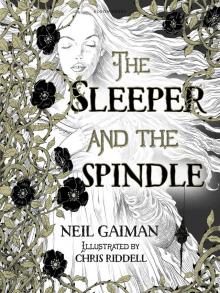 The Sleeper and the Spindle
The Sleeper and the Spindle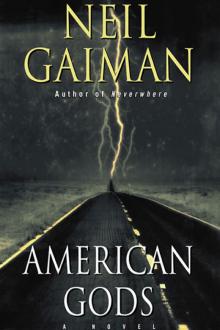 American Gods
American Gods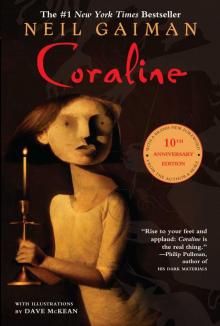 Coraline
Coraline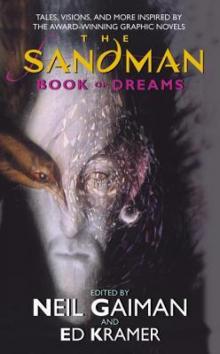 The Sandman: Book of Dreams
The Sandman: Book of Dreams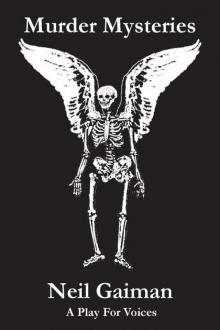 Murder Mysteries
Murder Mysteries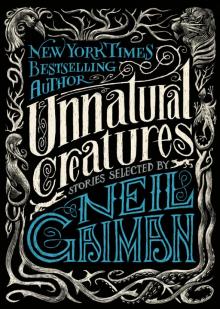 Unnatural Creatures
Unnatural Creatures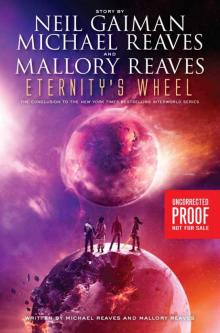 Eternity's Wheel
Eternity's Wheel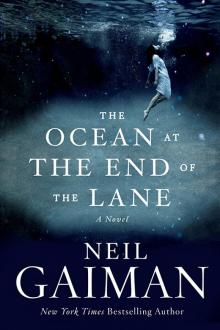 The Ocean at the End of the Lane
The Ocean at the End of the Lane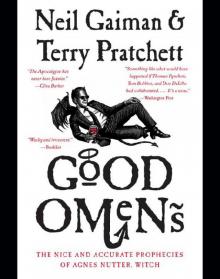 Good Omens
Good Omens Stardust
Stardust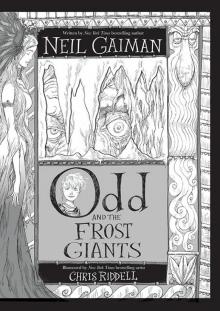 Odd and the Frost Giants
Odd and the Frost Giants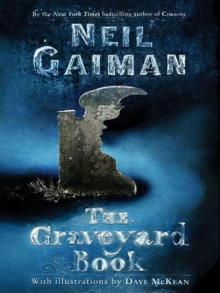 The Graveyard Book
The Graveyard Book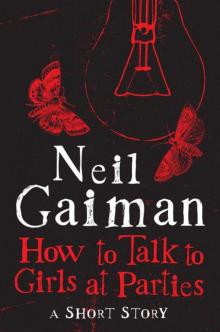 How to Talk to Girls at Parties
How to Talk to Girls at Parties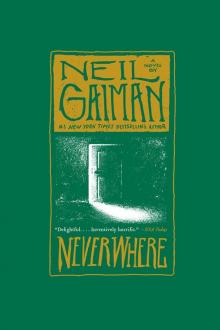 Neverwhere
Neverwhere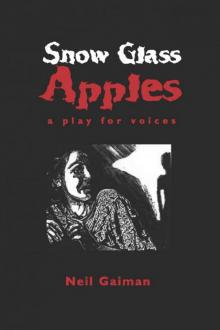 Snow, Glass, Apples
Snow, Glass, Apples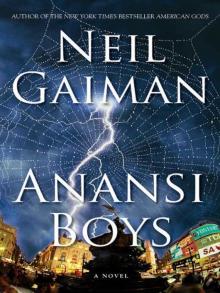 Anansi Boys
Anansi Boys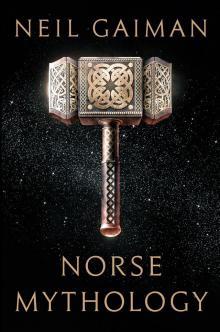 Norse Mythology
Norse Mythology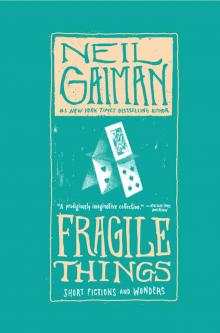 Fragile Things: Short Fictions and Wonders
Fragile Things: Short Fictions and Wonders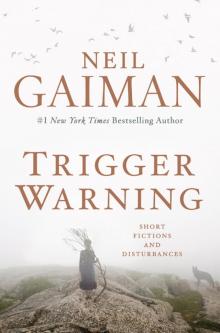 Trigger Warning: Short Fictions and Disturbances
Trigger Warning: Short Fictions and Disturbances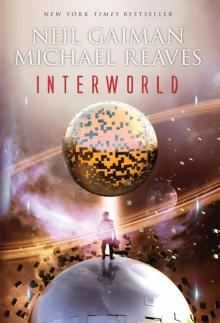 InterWorld
InterWorld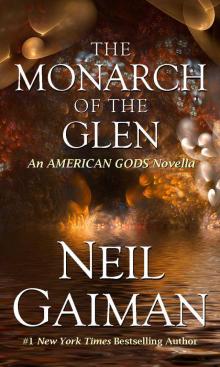 The Monarch of the Glen
The Monarch of the Glen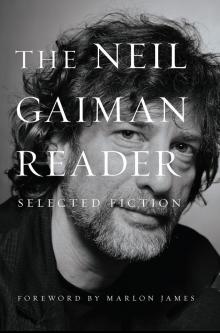 The Neil Gaiman Reader
The Neil Gaiman Reader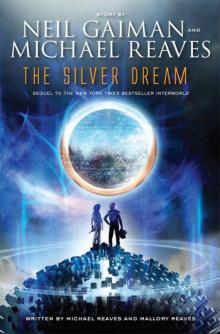 The Silver Dream
The Silver Dream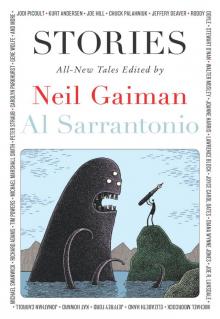 Stories
Stories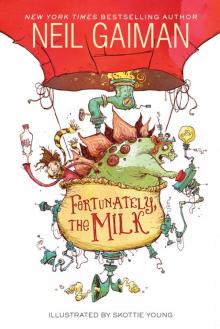 Fortunately, the Milk
Fortunately, the Milk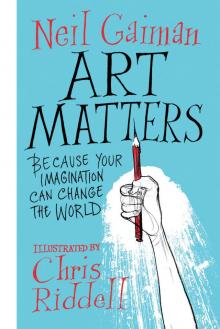 Art Matters
Art Matters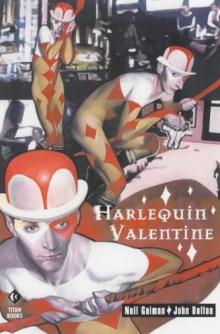 Harlequin Valentine
Harlequin Valentine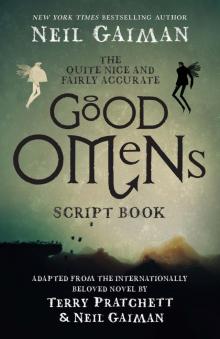 The Quite Nice and Fairly Accurate Good Omens Script Book
The Quite Nice and Fairly Accurate Good Omens Script Book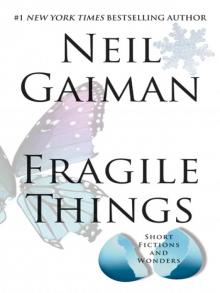 Fragile Things
Fragile Things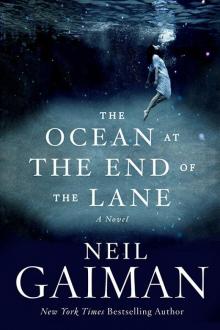 The Ocean at the End of the Lane: A Novel
The Ocean at the End of the Lane: A Novel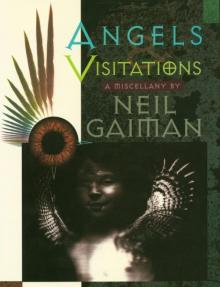 Angels and Visitations
Angels and Visitations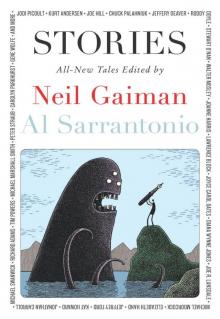 Stories: All-New Tales ngss-1
Stories: All-New Tales ngss-1 Don't Panic
Don't Panic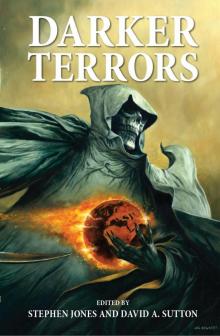 Darker Terrors
Darker Terrors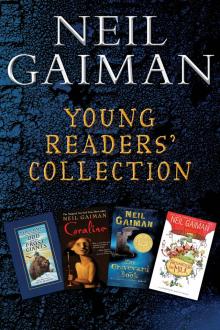 Neil Gaiman Young Readers' Collection
Neil Gaiman Young Readers' Collection A Study In Emerald
A Study In Emerald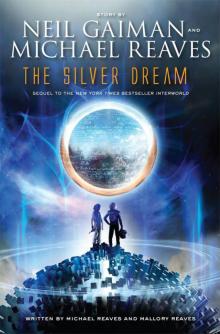 The Silver Dream: An InterWorld Novel
The Silver Dream: An InterWorld Novel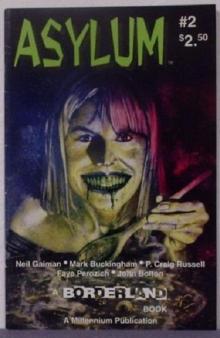 Feeders and Eaters
Feeders and Eaters Psychos
Psychos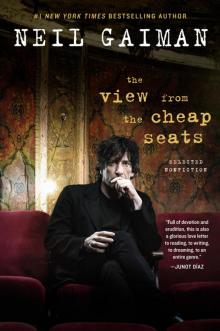 The View from the Cheap Seats
The View from the Cheap Seats Trigger Warning
Trigger Warning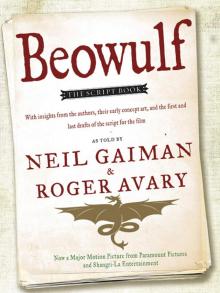 Beowulf
Beowulf Nessun Dove
Nessun Dove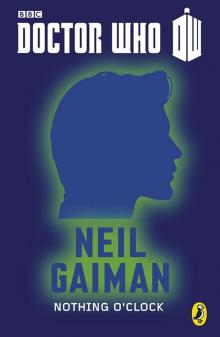 Doctor Who: Nothing O'Clock: Eleventh Doctor: 50th Anniversary
Doctor Who: Nothing O'Clock: Eleventh Doctor: 50th Anniversary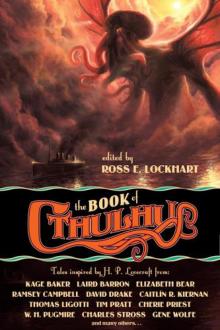 The Book of Cthulhu
The Book of Cthulhu